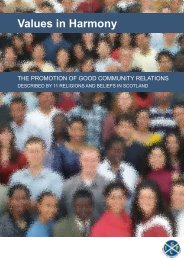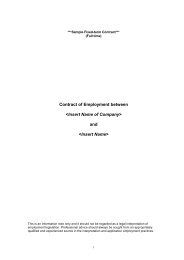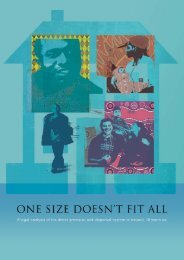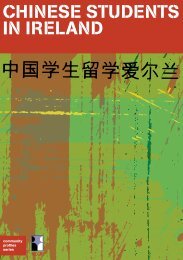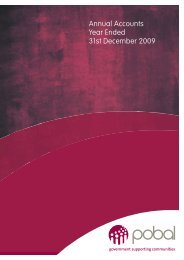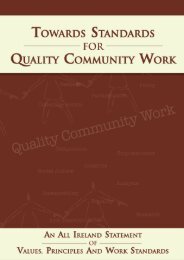The validity of rely<strong>in</strong>g solely on traditionaltest<strong>in</strong>g methods has been questioned asresearch shows that students fromculturally diverse backgrounds typicallyscore lower than students from <strong>the</strong>dom<strong>in</strong>ant culture on traditionalstandardized measures and aredisproportionately identified ashandicapped or <strong>in</strong> need of special services.(Lidz, C. Handbook for MulticulturalAssessment p. 533.)All this po<strong>in</strong>ts to <strong>the</strong> need for teachers and<strong>the</strong> formal exam<strong>in</strong>ation system to besensitive to <strong>the</strong> rich cultural, l<strong>in</strong>guistic andacademic diversity that is <strong>the</strong> fabric of Irishstudent life while at <strong>the</strong> same timebroaden<strong>in</strong>g <strong>the</strong>ir assessment tools toaccommodate this diversity.Assessment can have a number of differentroles <strong>in</strong> <strong>the</strong> post-primary school.• Used <strong>in</strong> a formative role, assessment<strong>in</strong>volves apprais<strong>in</strong>g or evaluat<strong>in</strong>g <strong>the</strong>work or performance of <strong>the</strong> students andus<strong>in</strong>g this to shape and improve <strong>the</strong>irlearn<strong>in</strong>g. The Assessment for Learn<strong>in</strong>gmodel identifies that mak<strong>in</strong>g available tostudents <strong>the</strong> criteria of judgement, <strong>the</strong>judgements which are made and positivedirections <strong>in</strong> how to take learn<strong>in</strong>gforward, provides opportunities topositively re<strong>in</strong>force and support students<strong>in</strong> future learn<strong>in</strong>g.• Used <strong>in</strong> a diagnostic role, assessmentenables <strong>the</strong> teacher and <strong>the</strong> school toidentify specific areas of learn<strong>in</strong>g difficultyfor a student and to use this <strong>in</strong>formation<strong>in</strong> plann<strong>in</strong>g for <strong>the</strong> student’s learn<strong>in</strong>g.• Used <strong>in</strong> an evaluative role, assessmentprovides teachers with an opportunity toidentify how effectively <strong>the</strong> teach<strong>in</strong>gstrategies and curriculum content be<strong>in</strong>gused are work<strong>in</strong>g with <strong>the</strong> students <strong>the</strong>irclass and provides <strong>in</strong>formation on whicha modification of approach can be based.• Used <strong>in</strong> a summative role, assessmentallows <strong>the</strong> teacher to identify outcomesof learn<strong>in</strong>g follow<strong>in</strong>g <strong>the</strong> completion of aunit of work or when report<strong>in</strong>g toteachers, parents and o<strong>the</strong>rs asappropriate. Formal exam<strong>in</strong>ations suchas end of year school exam<strong>in</strong>ations orstate exam<strong>in</strong>ations are also summative.92<strong>Intercultural</strong> <strong>Education</strong> <strong>in</strong> <strong>the</strong> <strong>Post</strong>-<strong>Primary</strong> <strong>School</strong>
ASSESSMENT AND CULTURAL DIVERSITY 7A number of assessment tools are used <strong>in</strong>post-primary education, <strong>in</strong>clud<strong>in</strong>g:• teacher observation• teacher-designed tasks and tests• work samples, portfolios and projects• curriculum profiles• externally prepared tasks andexam<strong>in</strong>ations• diagnostic tests• standardised tests.The qualitative and quantitative<strong>in</strong>formation provided by <strong>the</strong>se tools isalways subject to certa<strong>in</strong> assumptions andqualifications. Any assessment tool does nomore than provide <strong>in</strong>formation, which <strong>the</strong>nmust be <strong>in</strong>terpreted by <strong>the</strong> teacher.As all assessment tools conta<strong>in</strong> a potentialfor bias, an awareness of <strong>the</strong> variety ofassessment methods available and <strong>the</strong>irstrengths and weaknesses, is crucial toenabl<strong>in</strong>g teachers to arrive at balanced and<strong>in</strong>formed judgements.POTENTIAL BIAS IN ASSESSMENTThere is a longstand<strong>in</strong>g debate regard<strong>in</strong>g<strong>the</strong> appropriate strategies for use withm<strong>in</strong>ority populations and students withspecial needs. In Ireland, <strong>the</strong>re is ampleevidence to show that <strong>the</strong> system ofassessment and certification <strong>in</strong> postprimaryschools benefits certa<strong>in</strong> groupsmore than o<strong>the</strong>rs (Breen 1986, Hannan etal, 1996). In many studies, significantsocial-class differences have been foundshow<strong>in</strong>g that those from poorerbackgrounds do significantly less well thanthose from middle-class backgrounds atLeav<strong>in</strong>g Certificate. The reasons for thisare complex and while <strong>the</strong> system ofassessment and certification plays acontributory role it is not <strong>the</strong> only reasonfor <strong>in</strong>equalities <strong>in</strong> <strong>the</strong> performance ofstudents <strong>in</strong> state exams.Many argue that <strong>the</strong> present stateexam<strong>in</strong>ations assessment system re<strong>in</strong>forcesand accentuates <strong>the</strong> strong academic bias<strong>in</strong> second level school<strong>in</strong>g (CORI, 1998).O<strong>the</strong>rs po<strong>in</strong>t out that not only are <strong>the</strong>modes of assessment strongly academic,<strong>the</strong>y are also heavily orientated tol<strong>in</strong>guistic and to logico-ma<strong>the</strong>matical skills.Thus many human <strong>in</strong>telligences are notgiven recognition or respect, most notablypersonal <strong>in</strong>telligences (Lynch, 1999).Dur<strong>in</strong>g recent decades new developments<strong>in</strong> education-such as <strong>the</strong> <strong>in</strong>troduction ofTransition Year, <strong>the</strong> Leav<strong>in</strong>g CertificateApplied, <strong>the</strong> Leav<strong>in</strong>g Certificate VocationalProgramme, and new courses such as CSPEand SPHE, have provided opportunities fordevelop<strong>in</strong>g different abilities and forpioneer<strong>in</strong>g different models of assessment.Even with<strong>in</strong> <strong>the</strong> established Leav<strong>in</strong>gCertificate we see a grow<strong>in</strong>g move towardsmore than one po<strong>in</strong>t of assessment. Thereare 31 Leav<strong>in</strong>g Certificate subjects atpresent, of which fifteen <strong>in</strong>volve onewritten term<strong>in</strong>al exam<strong>in</strong>ation paper, eleven<strong>in</strong>volve both a written exam and aproject/practical, and five <strong>in</strong>volve a writtenand oral exam. The recent review of seniorcycle education <strong>in</strong> Ireland resulted <strong>in</strong>proposals for two assessment componentsfor all Leav<strong>in</strong>g Certificate subjects, with anemphasis on broaden<strong>in</strong>g <strong>the</strong> range of skillsassessed (Proposals for <strong>the</strong> FutureDevelopment of Senior Cycle <strong>Education</strong> <strong>in</strong>Ireland NCCA 2005).Identify<strong>in</strong>g potential for bias <strong>in</strong> assessmentThere are a number of ways that teacherscan be vigilant to <strong>the</strong> potential for bias <strong>in</strong>assessment. The follow<strong>in</strong>g section outl<strong>in</strong>essome of <strong>the</strong> ways that assessments can giverise to erroneous judgements aboutstudents, <strong>the</strong>ir learn<strong>in</strong>g or progress. Thiscan happen when assessment tools are<strong>the</strong>mselves biased, or when judgements are<strong>Intercultural</strong> <strong>Education</strong> <strong>in</strong> <strong>the</strong> <strong>Post</strong>-<strong>Primary</strong> <strong>School</strong> 93




